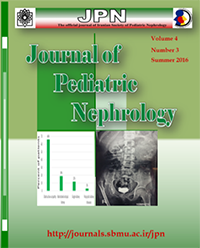Evaluation of the Parents' Functioning and Behavioral Disorders in Children with and without Vesicoureteral Reflux
Journal of Pediatric Nephrology,
Vol. 4 No. 3 (2016),
22 Dey 2016
,
Page 108-112
https://doi.org/10.22037/jpn.v4i3.15458
Abstract
Introduction: Vesicoureteral reflux is the backward flow of the urine from the bladder into the ureters or kidneys that may result in urinary tract infection. This paper aimed at evaluating this problem and its relationship with the children's mood, growth, and physical conditions as well as its influence on the family and school.
Materials and Methods: The study population consisted of 122 children aged 4-14 years old: 61 with and 61 without VUR. The Child Behavior Checklist (CBCL) and Global Assessment of Functioning (GAF) were used to assess the parents' behavior. The data were analyzed using descriptive statistics, Chi-square test, and t test.
Results: In this study, 23% of the children with and 4.9% of the children without VUR suffered depression (P value= 0.007). Moreover, 10.7% of the children with VUR showed offensive behaviors but there found no case among the children in the other group (P value=0.012). In addition, 16.4% of the children with and 1.7% of the children without VUR had intellectual problems (P value=0.008). Furthermore, 27.9% of the children with and 3.3% of the children without VUR had emotional problems (P value=0.001), and 4.9% of the parents of the children with VUR needed serious clinical measures but there were no such cases among children without VUR (P value=0.021).
Conclusions: Increased behavioral problems in children with VUR and declined parental functioning require prompt treatment to prevent future behavioral problems in children.
Keywords: Behavioral Problems; Vesico-Ureteral Reflux; Parents; Child.
How to Cite
References
Yousefichaijan P, Kahbazi M, Eghbali A, Taherahmadi H, Rafiei M. The Mean Platelet Volume in children with Pyelonephritis. Journal of Pediatric Nephrology 2016;4(2):56-59.
Assadi F. Psychological impact of chronic kidney disease among children and adolescents. Not rare and not benign. Journal of Nephrology 2013;10.
Fu LS, Hong YT, Shu SG. Height and weight growth in children with Vesicoureteral reflux diagnosed before one-year-old. Urology 2009;74(6):1314-1317.
Feigelman S. Growth, Development, and Behavior. In: Robert M, Kliegman RM, Richard E. Behrman RE. Nelson Textbook of Pediatrics.19th ed. Philadelphia: Saunders; 2011:26-46.
Amr M, Bakr A, Elgilany A, Hammad A, El-Refaey A, El-MougyA. Multi-method assessment of behavior adjustment in children with chronic kidney disease. Pediatric Nephrology 2009;24(2):341-347.
Von Gontard A, Mauer-Mucke K. Clinical behavioural problems in day and night– wetting children. PediatrNephrol 1999;13(8):662-7.
Chang SS, Ng CF, Wong SN, Hong kong child hood Enuresis Study Group Kwaichung Hospital, Hong kong. Behavioural problems in children and parenting stress associated with primary nocturnal enuresis in hongkong. Actapediatr 2002;91(4): 475-9
Yousefichaijan P, Safi F, Rafiei M, Taherahmadi H, Fatahibayate GA. Prenatal Risk Factors for Infantile Reflux Nephropathy. Journal of Pediatric Nephrology 2015;3(4):135-138.
Yousefichaijan P, Eghbali A, Taherahmadi H, Rafiei M, Naziri M. The Relationship between Iron Deficiency Anemia and Reflux-Related Renal Injury in Infant and Children. Journal of Pediatric Nephrology 2015;3(2):67-70.
Panagiota M, George G, Elena G, Helen G. Psychosocial and cognitive function in children with nephrotic syndrome: association with disease and treatment variables. Biopyschosocial medicine 2013:7 -10.
Doaa M, Abdelsalam M, Abozeid AM. Assessment of Behavior Abnormalities of Corticosteroids in Children with Nephrotic Syndrome. ISRN Psychiatry 2013;16;92.
PrathamaGuha, Arun De, Malay Ghosal. Behavior profile of children with nephrotic syndrome 2008; has been cited by in PMC.
- Abstract Viewed: 316 times
- PDF Downloaded: 206 times

